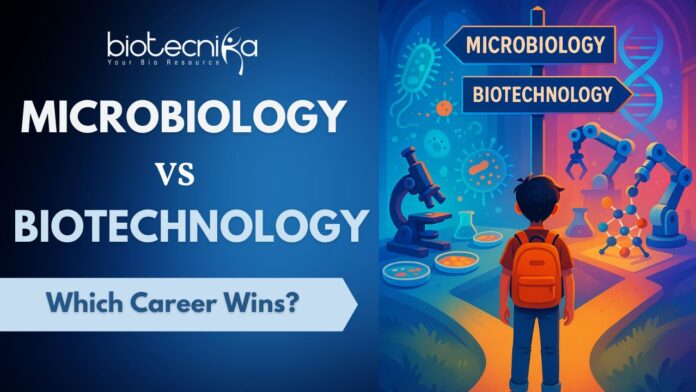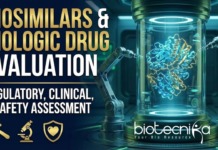Table of Contents
Microbiology vs Biotechnology
Microbiology and Biotechnology are at the heart of life sciences, working with the unseen world of microorganisms and the innovations that arise from them. Despite the fact that both fields deal with life, biology, and laboratory work, they are distinct in their methods, applications, and career paths. This article unwraps the definition, scope of each field, and makes you know how to pick the best course for your career.
What is Microbiology?
Microbiology is the study of microscopic organisms including Bacteria, Fungi, Viruses, and Protozoa, Algae. These microscopic organisms are known as Microorganisms. It looks into the roles, interactions, and effects these organisms have on people, animals, plants, and the environment. For instance, fermentation processes, disease diagnostics, and the production of vaccines and antibiotics are all based on microbiology. It has connections to environmental studies, food science, medicine, and pharmaceuticals.
Is Microbiology a Good Career?
Yes and in fact, there are many different career options in microbiology in government agencies, pharmaceutical companies, food industries, research labs, and hospitals. Postgraduate microbiologists, for instance, work in quality control in the food, beverage, and cosmetics sectors.
Environmental microbiology (bioremediation, waste management), Industrial microbiology (fermentation, biotech applications), and Clinical microbiology (diagnostics & infectious diseases) are emerging trends. In a time of global health concerns, there is an increasing need for qualified microbiologists. One source claims that the starting salary for a fresh MSc in Microbiology in India may be between ₹2.5 and 4.5 LPA, with mid-level salaries being between ₹5-8 LPA.
What to Do After BSc Microbiology?
Higher studies:
- MSc in Microbiology, Immunology, Virology, Molecular Biology etc.
- PhD, if you are interested in deep research or academics.
Job roles:
- Lab Technician / Lab Assistant in clinical or research labs.
- Quality Control Analyst in pharma, food or biotech industries.
- Clinical Research Associate in diagnostics or pharma.
- Environmental or agricultural microbiologist (soil, water, bioremediation) in environment/crop-science sectors.
Emerging/special-interest areas & certifications:
- Virology and vaccine development (especially post-COVID).
- Genetic engineering of microbes, microbial genomics.
- Certifications / short courses in bioinformatics, good lab practices (GLP), food safety.
What is Biotechnology?
The use of living systems and organisms to create new products is known as biotechnology. By using molecular, cellular, and genetic processes, it combines biology and technology to produce advances in genetics, medicine, agriculture, and the environment. Examples from the real world include industrial biotech applications, gene therapy, biofuels, genetically modified crops (GMOs), and biopharmaceuticals (like recombinant insulin).
Is Biotechnology a Good Career?
Yes, the biotechnology sector in India and around the world is expanding quickly. By 2030, the bio-economy in India is expected to grow to USD 300 billion. Biotechnologists, bioinformaticians, genetic engineers, research associates, and positions in biotech firms, research institutes, and startups are among the various roles available. Pharmaceuticals, industrial enzymes, diagnostics, agricultural biotechnology, and more are all included in this industry. Opportunities are being increased by startup culture and government support.
What to Do After BSc Biotechnology?
Higher education & specialisation:
- MSc in Biotechnology, Genetic Engineering, Bioinformatics, Molecular Biology.
- MTech/PhD in biotechnology or related fields for advanced research or academic careers.
- MBA in Biotechnology Management / Pharma Management, if inclined towards business side.
Employment options:
- QC/QA Analyst in the biotech/pharma industry.
- R&D Technician/Scientist in biotech labs or start-ups.
- Bioinformatics/Data Analyst for biotech companies.
- Bioprocess Engineer in manufacturing: biofuels, biopharmaceuticals, enzymes.
Emerging fields to keep an eye on:
- Artificial Intelligence / Machine Learning applied to biotech (bio-data, genomics).
- Regenerative medicine, tissue engineering.
- Synthetic biology, CRISPR gene-editing platforms.
Government Job Opportunities in Microbiology and Biotechnology
|
Sector |
Microbiology |
Biotechnology |
| Core Departments | ICMR, NCDC, AIIMS, FSSAI, DRDO | DBT, BIRAC, CSIR, ICAR, DRDO |
| Healthcare | Clinical Labs, Infection Control, Diagnostics | Genetic testing, vaccine R&D, bioinformatics |
| Agriculture | Soil microbiology, biocontrol, ICAR | Crop biotechnology, genetic engineering |
| Environment | Pollution Control Boards, Water Boards | Environmental biotech, biofuel research |
| PSUs | HAL, ICMR labs, State Health Missions | BIBCOL, IIL, NDDB, HLL Lifecare |
| Key Exams | CSIR-NET, ICMR-JRF, NHM recruitments | DBT-BET, GATE-BET, CSIR-NET, BIRAC Fellowships |
How to Choose the Right Career Path?
Students attempting to decide between microbiology and biotechnology should consider the following career advice:
Choose Microbiology if:
- The microbes themselves—bacteria, viruses, and fungi—and their effects on the environment and human health interest you.
- You take pleasure in research, laboratory work, pathogen diagnosis, and microbiological testing.
- You feel at ease pursuing a master’s or doctoral degree to specialize.
Choose Biotechnology if:
- You like the concept of creating or utilizing biological systems (engineering biology)—creating new products, utilizing biological data, or constructing objects.
- You want a wider variety of career options and feel at ease working in interdisciplinary fields like biology, chemistry, engineering, and computing.
- You’re prepared to acquire more technical skills (data analysis, molecular tools, bioinformatics)
Biotechnology and Microbiology are both research-driven, impactful, and promising fields. They all provide fulfilling careers in industry, innovation, health, and the environment. The best option is determined more by what fits with your passion, skill set, and long-term objectives than by “which is better overall.” You can create a fulfilling career path by concentrating on your passions, developing your abilities, and looking into internships early.
Whether you study microbes or manipulate genes, your journey in life sciences can shape the future of humanity!






























I want to experience with my new job. I studied msc in biotechnology.
I am student who finished msc in biotechnology and I am ready for new job .